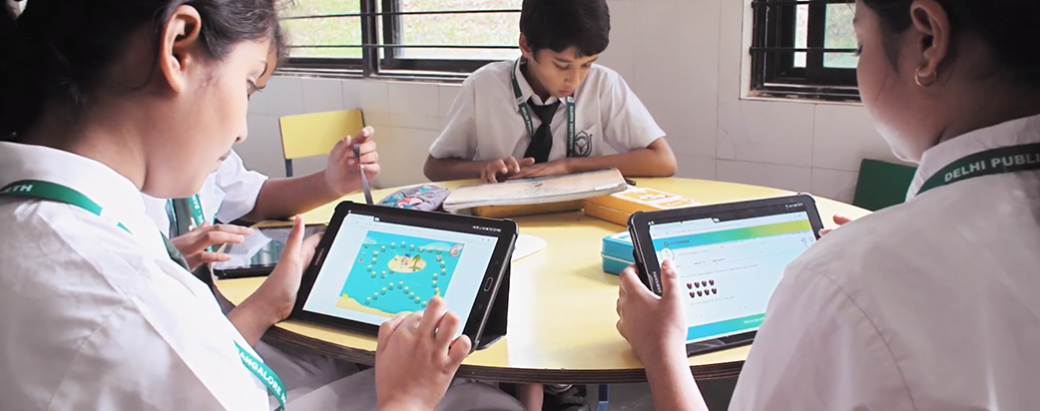
About the Project
This project is one of the 2017 WISE Awards finalists.
Technology has the potential to have a significant impact on student learning as it can be tailored to every individual’s unique style of understanding a concept. ‘Mindspark’, is a technology-based, personalized and adaptive learning program for maths and language. It was created with the experience and insight of 15 years of research and assessment data on the gaps or ‘misconceptions’ that students face while learning various concepts. The program has been deployed for over seven years, across elite private schools and low-income government schools, to help improve learning outcomes at scale in language and maths.
Context and Issue
The world’s largest and one of the fastest growing democracies is expending large amounts of political will, human capital and infrastructure to ensure that its population is well educated and skilled for the jobs of tomorrow. However, there unfortunately exists a large gap between the lucky few who are able to receive a high quality education, and the millions who get left behind due to material or emotional barriers that are out of their control. There are several reasons for this gap. A major challenge faced by educators is that their classrooms are heterogeneous – children absorb content in different styles and speeds, yet the system mandates students to intake material with a strict schedule, and via obsolete styles of teaching which are out of touch with the learning level of the majority of the class.
Research has found that the average eighth grade child is at the fourth grade level, and that the actual learning levels in the class range from grade 1 to 8. Even for the highly motivated and best paid teacher, it would be difficult to understand and adapt her teaching style to each student in her classroom.
According to the US Department of Labor, more than half the jobs that today’s students will be employed in tomorrow do not yet exist. Hence, it is far better to prepare students for any job rather than only those that exist today. To do this, children need to build the fundamental skills of logical reasoning and critical thinking, the pre-requisites of which are the ability to read and do basic math. Lack of teacher availability or established curriculum norms that do not address students’ current levels are leaving intelligent and motivated children behind, which leads to the almost 40 percent dropout rate plaguing India.
Solution and Impact
Mindspark is a technology-based, adaptive learning tool that is used by school students across India. Using Mindspark, students learn at their own pace – the software remains blind to a student’s current grade, and instead allows her to learn the fundamentals of the topics she needs to strengthen, before calibrating to the next logical step that should be taken in either learning, remediating, or enriching the specific concept.
Mindspark contains a series of tests designed to determine the actual level of learning – these are dynamic, appearing to students as per their current learning needs, and help determine how a student is progressing over time. These tests constantly assess, group and reassess students so that Mindspark is able to give content that is personalized to the skills that need to be mastered by each student. Students receive instantaneous feedback on correct as well as incorrect attempts of questions, games and remedial activities. Feedback is personalized based on the specific option that each student chooses. This allows students to understand exactly where they went wrong and how to remediate that mistake. Additionally, Mindspark can be delivered in both English and the mother tongue (Hindi). Use of the mother tongue language ensures that students are not left behind because of a language barrier, and can read and understand instructions comfortably.
To ensure that the opportunity to receive a world class education is in the reach of every child, no matter their geographical location or socio-economic background, learning centres in the urban slums of Delhi were set up. Children attended these ‘Mindspark Centres’ six days a week, spending 45 minutes per day learning maths and language concepts through the program. –. Here, Mindspark was evaluated in a J-PAL randomized controlled trial and showed a 2x-2.5x increase in learning outcomes compared to the control group. Every child, regardless of their baseline performance, benefited from Mindspark with only 4.5 months of exposure, with the weakest students showing the largest improvement in learning. Now, Mindspark endeavours to create a blueprint for the government of India and other developing nations on how to integrate such a technology-based model of learning to improve the learning outcomes of students going to public schools.
Future Developments
Going ahead, the Mindspark program will be integrated within the government school system itself, using existing resources devoted to education as a leverage to reach the most remote areas of the country. Mindspark will be a part of the school timetable for maths and language, and subject teachers will accompany students to a Mindspark ‘learning lab’ to access the tool. The program will be tailored to the curriculum, as mandated by the state government, and contextualized to the local geography. A state-wide rollout of Mindspark has the potential to not only impact millions of children, but educational policy as a whole, with Mindspark being at the center of a replicable blueprint for technology-based learning.


